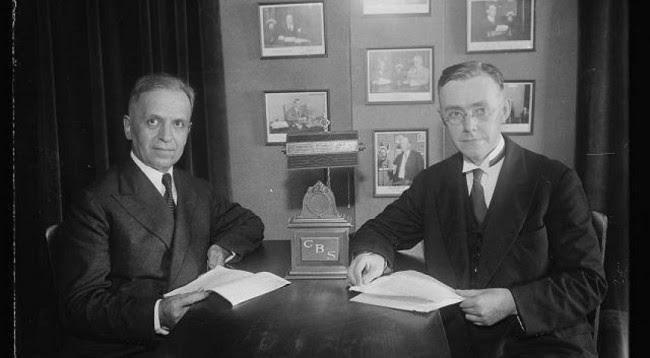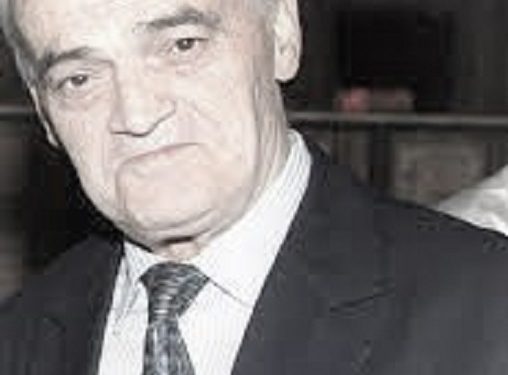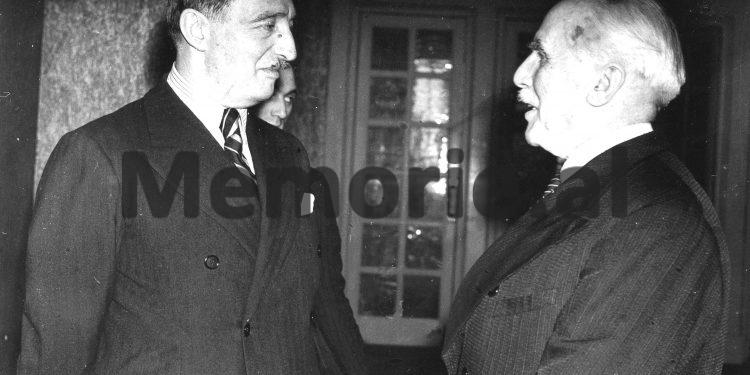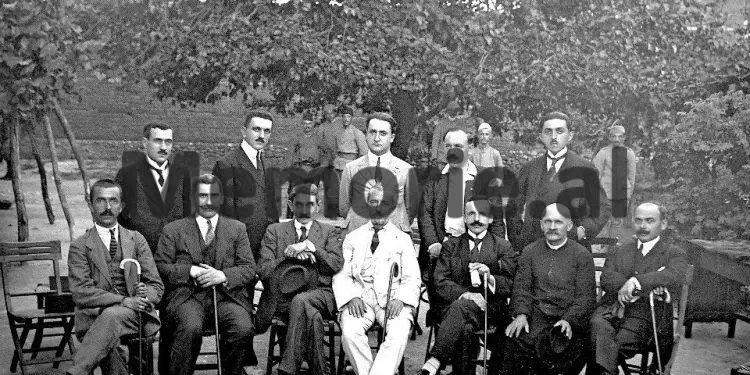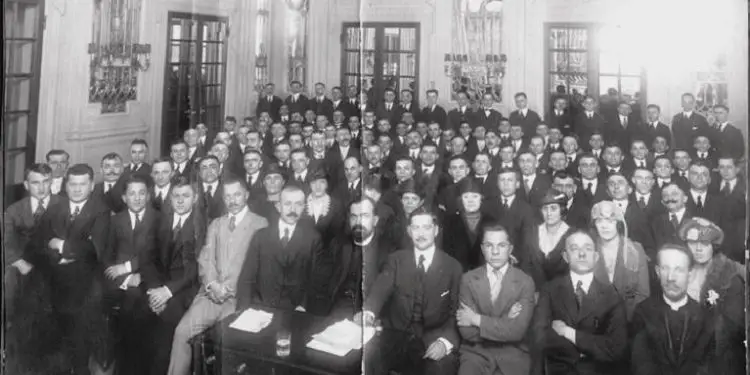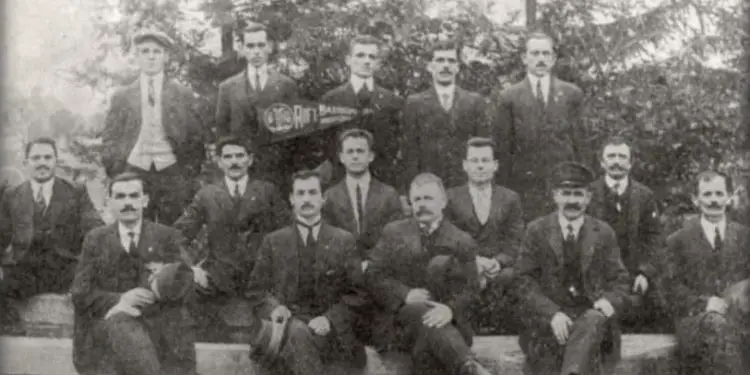By Idriz Lamaj
Part Two
Memorie.al / One of the best connoisseurs of the historical activity of “Vatra”, who served in its bosom for 60 years, wrote nearly 40 years ago: “Black Friday, April 7, 1939, found the Vatras badly divided: with two ‘Vatra’ and two ‘Diell’! After Albania was invaded by the Italian army and lost its national freedom, the two ‘Vatra’ immediately united and became once again one ‘Vatra’ and with one ‘Diell’. At that time, there was great hope for the unification of all patriotic Albanians in America around ‘Vatra’, but in vain. The 1940 Assembly elected Faik Konica as president of ‘Vatra’, who, after the occupation of Albania by Italy, was officially notified by high government authorities that his duty as Albanian minister in Washington had been terminated.
For reasons unknown “The well-read ‘Dielli’, the organ of ‘Vatrës’, published harsh criticisms against King Zog, who was a refugee in London with the entire Royal Family. That made the enemies happy and disappointed many ‘Vatrës’ and good Albanians”. (Refat Gurazezi: “Atdheu”, p. 3, August 1968, New York).
Continued from the previous issue
After Noli’s farewell with the famous eulogy before his corpse (Faik Konica) and the escort to his final residence, the efforts of “Vatrës” to protect national interests continue on the same political platform.
THE DIPLOMATIC ACTIVITY OF AN AMBASSADOR WITHOUT CREDENTIALS
On January 15, 1943, a month after the death of Faik Konica, the Leader of the Albanian Orthodox Church in America, who was also the Honorary President of “Vatra”, Bishop Noli sent the new ambassador to Washington. This ambassador without a state and without a government, the former Prime Minister of Albania, provided this historic credential:
Albanian Orthodox Church in America
Boston, Massachusetts
“The bearer of this letter, Mr. Petro Kolonja, 37 Marland Road, Worcester, Mass., and 1530 Sixteenth Street, Washington, D.C., has been appointed by His Majesty King Zog of Albania, as His representative in Washington, to replace the late Faik Konica, former Minister Plenipotentiary of Albania to the United States of America, entrusted with the special mission of securing the official recognition of the Albanian government in exile by the United Nations. Any support given to Mr. Kolonja will be highly appreciated by the entire Albanian people.”
Bishop F. S. Noli
26 Blagden Street,
Boston, Mass.
King Zog’s representative settled in Washington, in the same apartment where the late Konica lived and worked for years. At first, he found the full support of the secretary of the former minister of the Albanian Legation, Mrs. Charlotte Graham. Kolonja writes in some unpublished memoirs:
“Mrs. Graham helped me a lot, provided me with an apartment, gave me Konica’s phone book and his typewriter. She also brought me some household items, which I used even after I brought my wife and children to Washington.”
A week after arriving in Washington, Kolonja notified 24 foreign embassies with this letter:
“Your Excellency, I have the honor to inform you that I have been appointed Representative of King Zog of Albania in Washington, to replace the late Faik Konica, former Minister Plenipotentiary of Albania to the United States of America. In this capacity, I would be very grateful if you would grant me an interview at your most convenient time. In this way, I would express my thanks and respect to you in person.”
With respect, Petro Kolonja
King Zog’s Representative in Washington
To the White House, the Ministry of Foreign Affairs, the Ministry of War and other competent American offices, Kolonja sent letters with different contents. In each letter he pointed out the statement of Minister Hull of December 10, 1942, and requested the recognition of the territorial integrity of Albania and the Albanian government in exile by the United States of America.
To the Turkish ambassador, Kolonja sent a special letter of thanks for the denunciation that the Turkish state made to Italy on the occasion of the invasion of Albania. He also sent a similar letter to the Egyptian ambassador in Washington.
Meanwhile, he wrote a cordial letter to the British ambassador, in which he emphasized the old Anglo-Albanian friendship and the support of Great Britain, given to Albania in difficult times. In the letter he expresses his concern about Minister Eden’s statement, and requests that the British government recognize Albania’s territorial integrity as soon as possible. He writes:
“The Albanians are deeply concerned by the statement of the British Foreign Secretary, which leaves open the discussion of the borders of Albania, which have been established by an international commission.”
Kolonja took his first diplomatic steps based on Noli’s instructions and his reaction to the British minister’s statement. A month earlier, Noli had sent the following letter to the American Secretary of State:
“It is a great humiliation for a Bishop of the Christian faith to think that our great Christian democratic countries are playing every kind of political trick to please the Italian aggressor, while those two brave Mohammedan states (I mean Turkey and Egypt, I.L.) did not respect Mussolini at the height of his power, against the violated rights of the small Albanian people. I regret that our great Christian countries do not show the moral courage of Christianity.
I believe that there is no better guarantee that can be given to the Albanians than the official recognition of an Albanian government in exile under the leadership of King Zog and the security of the territorial integrity of Albania within the League of Nations. Such a guarantee is necessary to eliminate the doubts raised by Mr. Eden in his statement in the House of Commons, in which which clearly states that the Peace Conference should discuss the issue of the partition of Albania between its neighbors, the Greeks and the Yugoslavs.
November 28, 1943, marks a serious American demonstration in the defense of the territorial integrity of Albania. The “American Friends of Albania” Association hosted a commemorative dinner for the 31st anniversary of the Albanian Declaration of Independence, attended by nearly 120 people. At the dinner were several former diplomats, four or five senators and deputies, and two officials from the US State Department and the US military. Although the latter were “not participating on behalf of the government,” they made it clear that the defense of the territorial integrity of Albania was not a taboo subject in American diplomacy.
The President of the Association, former Ambassador of the United States of America to Albania, Charles C. Hart, opened the meeting with these words: “We are gathered here to publicly demonstrate our friendship towards Albania and the long-suffering Albanian people. The King of the Albanians and the former Prime Minister of Albania (I am talking about Noli, I.L.), with whom I spoke on the phone, I congratulated them on our behalf on November 28, expressing my full conviction that soon, the Albanian people will celebrate their Flag Day in a free, independent Albania and with state borders untouched by anyone.”
The next day, Kolonja wrote to Noli enthusiastically about the speeches given at the dinner hosted by the “American Friends of Albania.” He also cited several other speakers in the letter who were particularly concerned with the defense of Albania’s territorial integrity.
In 1943, political intrigues between the organization “Free Albania” and the “Vatra” Federation deepened. The Albanian group in London and Kosta Çekrezi demanded the abandonment of the formation of a government under the leadership of King Zog. Instead of a government, they proposed the creation of a committee. In their opinion, only around a committee could the United Front and the unification of Albanians in exile be realized.
This proposal, opposed by “Vatra”, set Çekrezi in motion. He held a meeting of his organization in Detroit and immediately declared in the newspaper “Liria” that “the protocol of unification was signed in Detroit”, since two branches of “Vatra” also participated in the meeting. The representative of a branch of “Vatra”, at that meeting, Refat Gurrazezi, regretted it and called Noli in Boston.
Gurazezi writes about Noli’s reaction: “From his voice, he seemed quite desperate and he was right. He kept me on the phone for half an hour, and before saying ‘good night’ he said this to me: ‘Tell those friends in Detroit that whatever happens, be it monarchy, republic or communism, there is no place for Çekrezi in Albania”! (R. Gurazezi “Atdheu”, August 3, 1868).
“Vatra” maintained an unwavering political stance until September 1944, when the government was established in Albania and emerged from the National Liberation Front. Kolonja continued his intensive activity, always in contact with Noli and the minister of the Royal Court in London. He wrote, translated, followed closely the Greek and Yugoslav political machinations and reported and reacted immediately to them.
The patriotic ambassador, without credentials, charged with a special mission by “Vatra”, Noli and the King, is dismissed from duty with this telegram: “As has been announced in due time, the liberation of the homeland brings your mission to an end. I thank you for your honor, Sotir Martini, London, February 22, 1945, one o’clock in the morning.”
The former representative of the King, quietly withdrawn from “Varta”, for years, continued the political campaign against the communist regime in Albania. He resided in Washington until the end of 1956.
Finally: The Albanian government in exile, the unification of American Albanians around the “Vatra” Federation and the United Front, about which so much was said, were never realized. Konica and Noli, during the occupation of Albania, made all-out efforts to ensure the territorial integrity of Albania and its inclusion in the anti-fascist war alliance.
They deeply influenced American diplomacy in the realization of their national goals. King Zog’s representative in Washington, Petro Kolonja, during those foggy years, proved to be a skillful diplomat. With his patriotic conscience, he maintained the Albanian political balance in exile, followed every international political activity with attention and immediately informed King Zog in London and Bishop Noli in Boston. He implemented the instructions of those who put him in charge with unparalleled precision and honesty.
Yugoslav analysts claim that the British Foreign Office statement (1942), which left open the discussion of the division of Albania in the South, had a profound effect on strengthening the position of the Yugoslav communists among the Albanian communists. This should not be surprising, if we look closely at the political and military support that the British government gave to the Communist Party of Yugoslavia and Marshal Tito during World War II.
The American government’s stance on the territorial integrity of Albania changed radically from the British stance. Although it was not a clear stance for the Albanians, the wise behavior of the American government with the Greeks and the silencing of their expansionist claims directly implied that Washington’s official policy was against the division of Albania.
The “American Friends of Albania” Association made an excellent challenge to Greek lobbying. The Association’s President, Ch. Hart was a friend and staunch defender of the high national interests of the Albanian people. The American government constantly consulted with him on Albanian issues. During the war, Mr. Hart maintained close ties with “Vatra”.
“It is no exaggeration to conclude that during World War II “Vatra” was the only Albanian organization, the only Albanian group that was politically correct”. (Prof. Beqir Meta: “Vatra’s” contribution to the Albanian issue, “Dielli”, January-March, 2003). The credit for this politically correct orientation goes to Faik Konica, Fan Noli, Petro Kolonja and the American friends of Albania. Memorie.al




